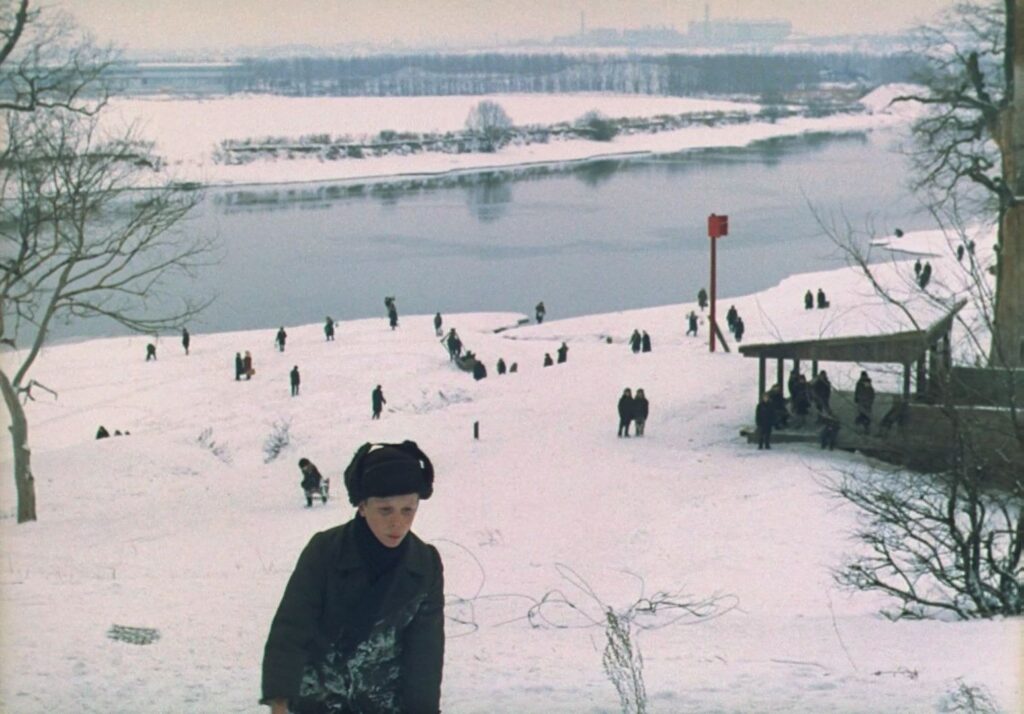

MIRROR, THE (ZERKALO)
(director/writer: Andrei Tarkovsky; screenwriter: Alexander Misharin; cinematographer: Georgi Rerberg; editor: Lyudmila Feiginova; music: Eduard Artemyev; cast: Innokenty Smoktunovsky (narrator), Margarita Terekhova (Mother/Natalya), Ignat Daniltsev (Alexei/Ignat, age 12), Filipp Yankovsky (Alexei, age 5), Larisa Tarkovskaya (Nadezha, wealthy woman/mother in country house), Alla Demidova (Lisa, Mother’s friend at printing house), Anatoli Solonitsyn (passer-by doctor), Tamara Ogorodnikova (Nanny/Neighbour/Strange woman at the tea table), Yuri Nazarov (Military trainer), Oleg Yankovsky (Father), Nikolai Grinko (Maria’s colleague at printing house), Alla Demidova (Liza), Maria Tarkovskaya (Alexei’s mother as an elderly woman); Runtime: 106; MPAA Rating: NR; producer: Erik Waisberg; Kino; 1975-Russia-in Russian with English subtitles)
“Tarkovsky shoots for the moon and for the most part succeeds in trying to make his personal story also a lesson in political art.”
Reviewed by Dennis Schwartz
The legendary, unorthodox and brilliant Russian filmmaker Andrei Tarkovsky (“Solaris”/”Andrei Rublev”/”Ivan’s Childhood”) in the fourth of his full-length seven films he completed before dying in 1986 presents a unique artsy autobiographical film shot in color with parts in black-and-white. His aim, as he stated, was to reveal things imprinted in his memory. It’s co-authored by Alexander Misharin, who brings in refreshing statements on the aesthetic and moral basis of an artistic work. The film is grounded by an unseen dying artist narrator (Innokenty Smoktunovsky) who reflects on three generations of the Tarkovsky’s family that covers ground in a non-linear order from his birth in 1935 and his idyllic childhood in the country that was broken only by the divorce of his parents. The narrator, representing himself as Andrei Tarkovsky, reflects on his relationships with his poet father, Arseni Tarkovsky, whose poems are read throughout the film in his real voice and give voice to what the film was about, and warmhearted mother (worked as a proofreader at a printing house) as both a child and adult. The narrator also tells of his relationship with his wife and son, and reveals his pungent thoughts on Russian society. The actors have interchangeable parts, which adds to the confusion. Margarita Terekhova plays the mother as a young woman and then puts down her pinned up hair to play the wife.
It’s told without plot, but gets its story across through flashbacks and stunning images. It’s meant to be more emotionally felt than being intellectual and though often impenetrable it always remains freshly original in its form and striking visions. Its theme of the effects of lost innocence and paternal abandonment in a troubled world can be universally understood. Tarkovsky shoots for the moon and for the most part succeeds in trying to make his personal story also a lesson in political art, as by intercutting personal events with historical documentary black-and-white newsreel footage of the evils of the Stalin regime to the haunting images of the Second World War (including a stunning sequence of the Soviet Army crossing Lake Sivash) to just what it means to be a Russian. The film is fascinating in breaking down time barriers and other rules of cinema to show how the past appears in the present, and its logic is that of a dream until awakened and things become hazy again.
The bulk of the emotional impact of the film comes from scenes of Andrei’s fatherless childhood. An early scene shows his neglected mom sitting on a fence by their country homestead and flirting with a passing village doctor who asks for directions. In another great scene there’s a mystical flashback following the narrator’s father’s return from a long absence. His mother washes her hair in a basin and water drips down from the roof as she walks inside the house in a blissful mood and gazes into a full-length mirror, and then in another mirror across the room her image is transformed into an old woman. There will be many other provocative mirror scenes throughout the film. There’s a scene that meant much to Tarkovsky as it shows him as a young man testing a military instructor’s patience by being difficult, and of him as a child leafing through an art book of Leonardo da Vinci’s drawing of “A Young Lady With A Juniper” in his early quest for knowledge that coincides with the joyful moment his father came home on leave.
In adding some personal touches, the director had his real-life mother Maria act as the mother in old age, his wife Larissa acts as the doctor’s wife to whom the mother sells an earring, and his stepdaughter acts as the red-headed girl with whom the narrator falls in love as a young boy.
The State Cinema was displeased with the film, unable to comprehend it artistically and they therefore determined it was an elitist work. As a result they limited its showing in Russia to only a few small suburban theaters and put the director on notice that he was on the outs and would one day have to work outside Russia. Though it is truly a difficult film to get a handle on, the effort to do so is worth it. It’s now rightly looked upon as one of Tarkovsky’s great films.
REVIEWED ON 7/30/2006 GRADE: A https://dennisschwartzreviews.com/